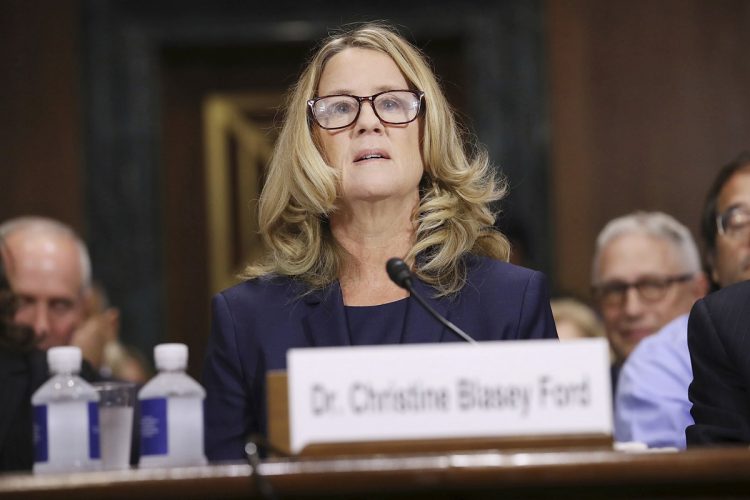Blasey Ford's Courage Will Change History
Civil rights of any kind are always won the hard way, with painful losses that always seem more visible and more numerous than the wins. But progress is not won from the top down.
October 10, 2018 at 02:58 PM
3 minute read
 Christine Blasey Ford testifies before the Senate Judiciary Committee, Thursday, Sept. 27, 2018 in Washington. (Win McNamee/Pool Image via AP)
Christine Blasey Ford testifies before the Senate Judiciary Committee, Thursday, Sept. 27, 2018 in Washington. (Win McNamee/Pool Image via AP)
What happened these last two weeks? A woman traumatized by sexual assault, who carefully rebuilt her life with strength, bravery, and intelligence, relives her trauma before millions for love of the country and her sense of civic duty. And a power structure—that doesn't necessarily disbelieve the woman but instead, far worse, just doesn't care—rushes to elevate one of their own to the highest court. The striking contrast between the two witnesses in credibility and temperament, and the obvious need for a thorough investigation, are ignored in a desperate sprint to end the proceedings. This was Dr. Christine Blasey Ford's fear before going into the process—that she would suffer all the pain and not change the result.
But that is emphatically NOT the message that we take from the events of the Judge Brett Kavanaugh hearings. We take from Dr. Ford a message of courage and determination. These are bleak days, and Judge Kavanaugh's elevation hurts like hell, but we understand that social movements do not just leap from victory to victory until they cross the finish line. Quite the opposite, in fact. Civil rights of any kind are always won the hard way, with painful losses that always seem more visible and more numerous than the wins. But progress is not won from the top down. And the history of human rights is not made by the leaders; it is made by the people in their millions, suffering, losing, marching, arguing bitterly over family dinner tables, raising uncomfortable conversations on campuses and in workplaces, waking up hearts and minds, going to court, proposing legislation, and of course voting.
Dr. Blasey Ford has certainly suffered, but she has not lost. She has started millions of conversations, touched millions of hearts, and changed the world in ways she probably, right now, can't imagine. It is ironic that Dr. Blasey Ford, as a scientist, clearly values what can be measured and predicted—because there is no way to measure or predict the countless ways in which her heroic example will move people to action in years to come. We trust that a fairer world is in our future, and if we can, we will help to make it so.
Students who support this letter
Kelly Amorim, Alex-Marie Baez, Brittani Bushman, Gabriella Cavanagh
Olivia Cox, Megan Crandall, Ashley Dunbar, Jake Eisland, Kimberley M. Felton
Jessica N. Haller, Theresa Hotte, Kristen Ippolito, Alicia Johnson
Elena I. Kilcullen, Mary Ann Krisa, Mehtasim Mahfuz, Katherine Martinez
Robert McQueen, Elizabeth Murad, Kevin Nelson, Alexandrea Nuwer
Bryan O'Keefe, Shannon Owens, Kirsten (Kris) Paap, Ph.d., Jon Pritchard
Angelica Rivera, Delaney Rives Knapp, Victoria A. Soracco, Gloria Sprague
Allee von Stackelberg, Avery Sullivan, Emily Vaculik, Candace White
Faculty who support this letter
Vincent M. Bonventre, Raymond H. Brescia, Christine Sgarlata Chung
Stephen Clark, Jaya Connors, Danshera Cords, Anthony Paul Farley
Mary A. Lynch, Nancy M. Maurer, Connie Mayer, Sarah F. Rogerson
This content has been archived. It is available through our partners, LexisNexis® and Bloomberg Law.
To view this content, please continue to their sites.
Not a Lexis Subscriber?
Subscribe Now
Not a Bloomberg Law Subscriber?
Subscribe Now
NOT FOR REPRINT
© 2025 ALM Global, LLC, All Rights Reserved. Request academic re-use from www.copyright.com. All other uses, submit a request to [email protected]. For more information visit Asset & Logo Licensing.
You Might Like
View All
A Biblical Reconciliation Between Judaism and Islam: A Lesson for Everyone, Everywhere
6 minute readTrending Stories
Who Got The Work
J. Brugh Lower of Gibbons has entered an appearance for industrial equipment supplier Devco Corporation in a pending trademark infringement lawsuit. The suit, accusing the defendant of selling knock-off Graco products, was filed Dec. 18 in New Jersey District Court by Rivkin Radler on behalf of Graco Inc. and Graco Minnesota. The case, assigned to U.S. District Judge Zahid N. Quraishi, is 3:24-cv-11294, Graco Inc. et al v. Devco Corporation.
Who Got The Work
Rebecca Maller-Stein and Kent A. Yalowitz of Arnold & Porter Kaye Scholer have entered their appearances for Hanaco Venture Capital and its executives, Lior Prosor and David Frankel, in a pending securities lawsuit. The action, filed on Dec. 24 in New York Southern District Court by Zell, Aron & Co. on behalf of Goldeneye Advisors, accuses the defendants of negligently and fraudulently managing the plaintiff's $1 million investment. The case, assigned to U.S. District Judge Vernon S. Broderick, is 1:24-cv-09918, Goldeneye Advisors, LLC v. Hanaco Venture Capital, Ltd. et al.
Who Got The Work
Attorneys from A&O Shearman has stepped in as defense counsel for Toronto-Dominion Bank and other defendants in a pending securities class action. The suit, filed Dec. 11 in New York Southern District Court by Bleichmar Fonti & Auld, accuses the defendants of concealing the bank's 'pervasive' deficiencies in regards to its compliance with the Bank Secrecy Act and the quality of its anti-money laundering controls. The case, assigned to U.S. District Judge Arun Subramanian, is 1:24-cv-09445, Gonzalez v. The Toronto-Dominion Bank et al.
Who Got The Work
Crown Castle International, a Pennsylvania company providing shared communications infrastructure, has turned to Luke D. Wolf of Gordon Rees Scully Mansukhani to fend off a pending breach-of-contract lawsuit. The court action, filed Nov. 25 in Michigan Eastern District Court by Hooper Hathaway PC on behalf of The Town Residences LLC, accuses Crown Castle of failing to transfer approximately $30,000 in utility payments from T-Mobile in breach of a roof-top lease and assignment agreement. The case, assigned to U.S. District Judge Susan K. Declercq, is 2:24-cv-13131, The Town Residences LLC v. T-Mobile US, Inc. et al.
Who Got The Work
Wilfred P. Coronato and Daniel M. Schwartz of McCarter & English have stepped in as defense counsel to Electrolux Home Products Inc. in a pending product liability lawsuit. The court action, filed Nov. 26 in New York Eastern District Court by Poulos Lopiccolo PC and Nagel Rice LLP on behalf of David Stern, alleges that the defendant's refrigerators’ drawers and shelving repeatedly break and fall apart within months after purchase. The case, assigned to U.S. District Judge Joan M. Azrack, is 2:24-cv-08204, Stern v. Electrolux Home Products, Inc.
Featured Firms
Law Offices of Gary Martin Hays & Associates, P.C.
(470) 294-1674
Law Offices of Mark E. Salomone
(857) 444-6468
Smith & Hassler
(713) 739-1250









